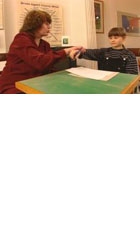
Dyslexia + Dyspraxia 2004
Distributed by Chip Taylor Communications, 2 East View Drive, Derry, NH 03038-4812; 800-876-CHIP (2447)
Produced by Discovery Health Company and Quantum Leap, Ltd.
Directed by Serena Macbeth
VHS, color, 30 min.
Adult
Learning Disabilities, Alternative Medicine, Education, Parenting, Child Development
Date Entered: 12/01/2004
Reviewed by Maureen Puffer-Rothenberg, Valdosta State University, Valdosta, GAOne episode in the series Complementary Kids (aka Complementary Childcare) produced by the Discovery Health Channel, Dyslexia + Dyspraxia provides information about how these conditions can affect children in their schoolwork and in social situations, then profiles three British children who have benefited from alternative therapies.
Educational psychologist Patricia Rouse explains that dyslexia (which affects a child’s reading and spelling ability) and dyspraxia (affecting spatial perceptions) are neurological disabilities, emphasizing that dyslexic and dyspraxic children are not unintelligent. Rouse provides commentary throughout the program about traditional and alternative approaches to educating children with learning disabilities.
In Part 1, an educational kinesiologist discusses “brain gym” activities and is shown working with a young girl who has dyslexia. Part 2 shows a neurodevelopment therapist working with a young boy who has dyspraxia and an auditory integration/ syntonics practitioner working with a dyslexic boy. The therapists discuss the theories behind their treatments, the symptoms they observe in children, the types of exercises they assign and why the exercises work.
Both include interviews with parents about how they realized their children had problems at home and school, and the positive effects the children have experienced from alternative therapies. The children talk about their learning disabilities and the effects of treatment, noting happily that their schoolwork is easier and their friends have noticed their improvement.
The overall tone of the program is positive and hopeful, and should be appealing to parents and lay people. The program offers plenty of comments from parents and children in addition to those of the experts; the therapists’ discussions are not too technical and their commitment to the children they treat is evident. The children obviously enjoy their therapeutic work.
Intended for parents seeking information about learning disabilities and possible treatments, Dyslexia + Dyspraxia is appropriate for public libraries serving parents and teachers as well as academic libraries serving educators. The program is recommended for parents, teachers and others who are interested in complementary approaches to treatment for learning disabilities.